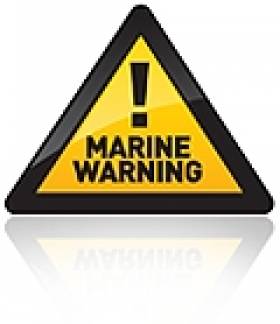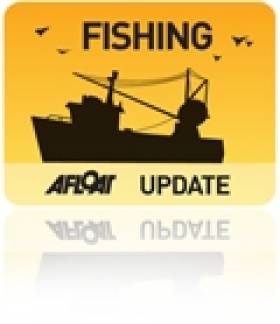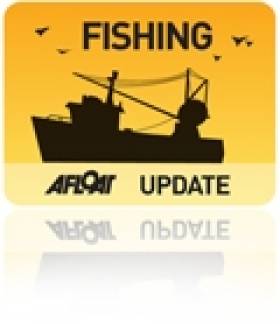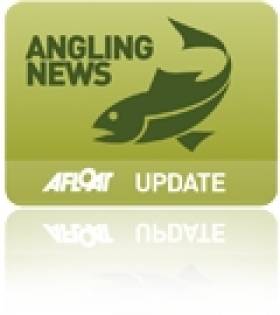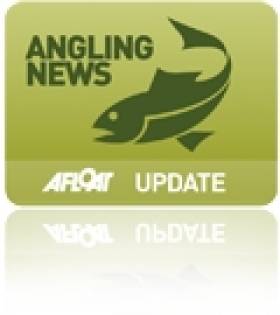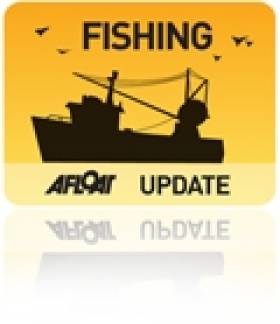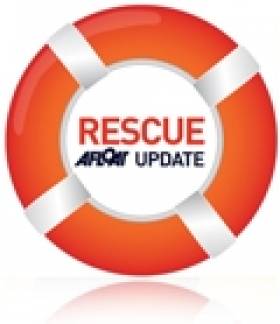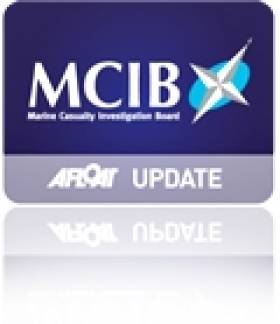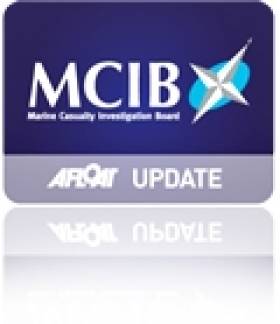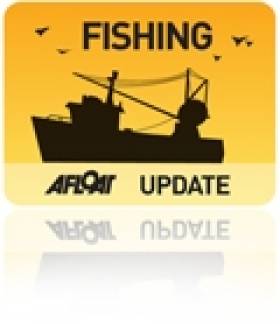Displaying items by tag: Fishing
Campaign to Get Fishermen to Wear Lifejackets
Despite seven fishermen losing their lives at sea this year to date, a laissez-faire attitude to safety still exists in the industry, particularly in relation to the wearing of lifejackets. In an effort to get fishermen to take notice of the real danger of going to sea without wearing a lifejacket, Noel O'Sullivan, a fisherman from Castletownbere, Co. Cork will act as Ambassador for the campaign. Noel survived an accident at sea, along with his six crew, when his vessel 'Discovery' capsized off the Isles of Scilly on the 29th January, 2007.
Noel describes the day of the accident...'I will never forget that day. As we were hauling in the catch, I knew there was something wrong. She was listing dangerously and I instructed the crew to launch the life rafts and jump overboard. As we jumped, she listed violently and capsized onto one of the life-rafts - puncturing it.....I treaded the freezing water for more than two hours until we were rescued..... I was terrified going back fishing but I went back as it's my livelihood, it's what I know...the difference is, I am more aware of the dangers now and I insist all my crew wear lifejackets. I would appeal to all fishermen to do the same' (Hear Noel's full story on BIM's website, www.bim.ie.
The fatality rate for Ireland's fishing sector stands at 88 per 100,000, making it 48 times more hazardous than other occupations*. Wearing a suitable lifejacket is the single most effective measure a fisherman can take to increase the chance of survival if involved in a man-overboard accident at sea.
Jason Whooley, BIM's CEO appeals to the fishing industry: 'I am sincerely asking all fishermen to wear their lifejackets. It could be the difference between life and death, it is that simple. Despite being a legal requirement, it is not something that is taken seriously enough in the fishing sector. We aim, along with our partners, IWS and the RNLI, to change this mentality through a targeted and ongoing safety campaign and I am delighted that Noel, who has personally survived an accident at sea, is helping us to drive this important message home.'
Current RNLI statistics suggest that less than 35% of fishermen regularly wear a lifejacket. Many fishermen feel that wearing a jacket inhibits their mobility and makes working on deck much more difficult. Part of this awareness campaign will be highlighting that there are a growing range of lifejackets that fishermen can use to suit their method of fishing and skippers and crew have a responsibility to themselves, work colleagues and family to consider the available options. In fact, there are new lifejackets on the market that are extremely light and compact and would not interfere with work on deck at all.
Coveney Seeks British Support on Mackerel
The meeting took place in Luxembourg, where Minister Coveney is attending an EU Council of Agriculture & Fisheries' Ministers.
The Ministers discussed the ongoing mackerel negotiations in London, which are critical for their respective fishing industries, which together have the majority of the EU mackerel catch. Ministers agreed that the current unrestricted, irresponsible fishing of mackerel by Iceland and the Faroe Islands was totally unacceptable and would result, if continued at its current level, in the destruction of the stock.
The Ministers agreed to work together to secure an agreement on a fair share of Mackerel for Iceland and the Faroes. Minister Coveney said "I appreciate that serious efforts are underway to reach agreement on the share out of Mackerel, which is Ireland's most important fishery. I am very concerned that an agreement is not secured at a high cost as the share given to Iceland and the Faroes involves a reduction in Ireland's share. The share agreed, therefore, must be fair and proportionate. I welcome the outcome of today's meeting with my Ministerial counterparts to closely cooperate in the negotiations, in order to protect the interests of our fishing industry, which is dependent on a sustainably managed Mackerel stock."
Minister Coveney also said that the Ministers had agreed "to strongly demand trade sanctions, promised by Commissioner Damanaki, in the event that either Iceland or the Faroes are not prepared to stop their irresponsible fishing."
In addition to their discussions on the mackerel issue, the Ministers also discussed progress and their respective priorities on the reform of the CFP and the upcoming negotiations on TACs and quotas.
Bass Fishing Permit Refusal is Welcomed
Environmentalists have welcomed the decision by the Minister for the Marine to refuse a permit for commercial sea bass fishing in the Celtic Sea, The Irish Times reports.
The Friends of the Irish Environment hailed Minister Simon Coveney's retention of the total ban on commercial exploitation of sea bass stocks.
Anglers are only permitted to keep two of such fish measuring more than 40cm in any 24-hour period.
There has been much opposition to the proposal by the Federation of Irish Fishermen to lift the ban on commerical bass fishing.
The species has been on the protected list for more than 20 years but this protection was only made permanent in 2006.
Freeze on NI Fishing Licence Fees
Northern Ireland's sports minister has announced that there will be no increase in fishing licence fees for the 2012 angling seasons.
Carál Ní Chuilín said that "In light of the current economic climate, I have decided to keep the salmon and inland fishing licence fees at 2011 levels."
It marks the third year in a row that there has been no annual increase in fees for fishing licences.
The Minister added: "I hope this will continue to ease the financial burden on those involved in the commercial fishing sectors and encourage others to enjoy recreational fishing.”
The only changes for next year will be on fishing permits for the Public Angling Estate, which are subject to an inflationary rise of 4.8%.
The NI Department of Culture, Arts and Leisure says it is encouraging all fishermen and women to ensure that they have a rod licence and the correct permit to fish.
Those caught without the necessary documents will be reported with a view to prosecution, it says.
Fishing licences and permits are available to purchase online at www.nidirect.gov.uk/angling
New Fisheries Partnership for the River Shannon
The new group will comprise representatives from both bodies as well as Inland Fisheries Ireland, and will be independently chaired by former Shannon Fisheries Board CEO Eamon Cusack.
The plan is for anglers, fishery authorities and stakeholders to come together to assist in the management of the River Shannon.
At the group's launch in Athlone recently, Cusack said the partnership was working toward ensuring a sustainable yield of fish.
Crew Rescued from Sinking Fishing Boat off Donegal
The Irish registered 'Amy Jane' fishing vessel began taking in water about 13 miles off Malin Head this morning and was evacuated at 0945. The crew took to liferafts before being rescued. More details as we have it.
More from HM Coastguard
At 09.45am, Belfast Coastguard received a mayday call from a fishing vessel reporting that they were taking water and sinking.
The six crew of the fishing vessel took to their liferaft, dressed in their survival suits and took with them their EPIRB (Emergency Position Indicating Radio Beacon) which they had activated and a handheld VHF Radio.
Belfast Coastguard working with Malin Head Coastguard who had direct communications with the liferaft initiated a search and rescue mission to rescue the men.
The Irish Coastguard helicopter Rescue 118 based at Sligo was requested and was the Coastguard Helicopter Rescue 100 based at Stornoway.
The RNLI lifeboats from Portrush and Lough Swilly were also requested to launch.
The fishing Amy Jane SO876 registered in Sligo was 13 miles north of Malin Head when it made the mayday call.
The weather was reported as being North Westerly, Force 6 with a moderate swell.
Coleraine Coastguard rescue team are at City of Derry airport to receive the survivors.
Steve Carson, Watch Manager, Belfast Coastguard said:
We are pleased that this has been a successful rescue of six fishermen.
Sea Survival training which is undertaken by crew of fishing vessels and being properly equipped is a key factor in the rescue of these six men today.
Lost Irish Fishermen Found Safe and Sound Off Minehead
FOUR Irish fishermen reported missing on Sunday have been found in good spirits off the coast of Minehead in Somerset.
This Is The West Country reports that the four men had left Helvick harbour in Co Waterford early on Sunday on a fishing trip but got lost shortly thereafter.
After contacting the coastguard with their concerns, the Helvick Head RNLI lifeboat was dispatched to Minehead, where the lost boat had been found by another fishing vessel, Faoilean Ban.
The lost fishermen subseqently followed the Faoilean Ban back to port at Helvick.
MCIB Report on Sinking of Fishing Vessel 'Ainmire'
A breach in the engine compartment caused the fishing vessel Ainmire to take on water and sink off the coast of Scotland in April last year, according to the official report into the incident.
All crew on board the vessel were transferred safetly to another fishing boat that responded to its distress call, some 30 miles northwest of the Butt of Lewis on the morning of 29 April 2010.
The Marine Casualty Investigation Board (MCIB) report concluded that the failure of a sea water cooling pipe in the engine room was the most likely cause of the flooding, and pointed to the fact that the pipework had not been renewed during the life of the vessel.
It was also noted that the bilge pump and its motors were located under the floor plates in the engine room, and thus were inoperable when the water level had risen in the compartment.
In addition, the MCIB report found that the Ainmire has been operating without a Fishing Vessel Safety Certificate for more than six months at the time of the incident.
Though the owner had submitted a survey application and paid the required fee to the Marine Survey Office (MSO) the previous summer, a communication breakdown resulted in the required survey not being carried out before the expiration of the vessel's previous certification.
The MCIB advised boat owners and operators to be extra vigilant regarding the location of bilge pumps in their vessels.
It also warned that survey applications for certification "may not accommodate all situations", and that the issuing of a recepit is not a guarantee that an application is being dealt with.
The full report is available to download as a PDF from the MCIB website HERE.
MCIB Highlights Danger of Fishing Without Safety Gear
The Marine Casualty Investigation Board (MCIB) has called on the Government to continue highlighting the dangers of operating boats without adequate safety equipment, following its report into the death of a Wexford fisherman last year.
Michael O'Connor drowned after going overboard from his small open boat while fishing alone at Cullenstown, Co Wexford in the early hours of 7 September 2010.
The local Irish Coast Guard unit initiated a search when he did not return as expected later in the morning. His body was subsequently located next to his upturned boat around 9am.
It is not known to investigators how O'Connor came to be in the water when the incident occurred. He was found to be wearing a lifejacket, but no flares, VHF radio or other safety equipment were found on board his vessel.
The boat itself was also not a registered fishing vessel, and was unsuitable for carrying the fishing gear O'Connor had been using.
The report stated: "The combination of boat size, darkness, weather conditions, tidal flow, fishing equipment and the absence of safety equipment other than a lifejacket combined to increase the danger and reduce the chance of survival."
The full report is available to download as a PDF from the MCIB website HERE.
Low Cost Device Could 'Revolutionise' Commerical Fishing, Say Backers
A new, hi-tech global tracking device that could revolutionise the way the commercial fishing industry operates is to be officially launched following a series of successful trials across the South West of England.
Succorfish has worked closely with Seafish to design its newest and most advanced vessel monitoring system; the SC2. It has been developed specifically for the fishing industry and will allow vessels to accurately map and monitor their position using dual GPRS/GSM software to within one metre, provides closer access to marine protected areas such as Lyme Bay whilst avoiding hefty fines previously incurred when breached, and improve and increase overall inshore fishing activity.
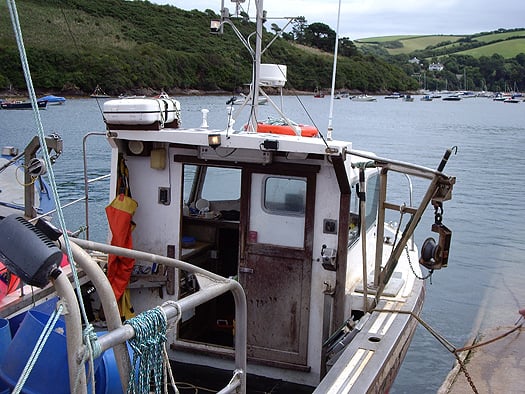
Succorfish's new hi-tech global vessel monitoring system, the SC2, can be seen to the right of the light on the wheel-house
The low cost device complies with current UK fishing laws and uses real time satellite and mobile phone technology, as well as online tracking software, to monitor and record the course and position of vessels via up-to-the-minute reporting. Information is then relayed back to a password protected website where users can view their personal data through a graphical user interface.
And, with new EU legislation being introduced in 2012 that will force all 12m-15m vessels to have monitoring systems with satellite reporting, the SC2 is now being regarded as the cost
effective solution to a worldwide fishing industry problem. Additionally, for vessels 15m and over, the product is also e-log ready and directly interfaces with a specialist, state-of-the-art catch reporting software system via a global satellite network.
Nick Prust, SWIFA Chairman and owner of one of the vessels that took part in the trials commented, “This is the solution that the industry has been looking for and the system will be
a real asset to fisherman regardless of their fishing methods. It will give us continued access to fishing grounds with spatial and temporal restrictions whilst allowing us to co-exist alongside
newly proposed MPA’s.”
George Henricks, Commercial Director of Succorfish added, “We have worked very closely with industry representatives and listened long and hard to all of the stakeholders who have
participated in the inshore VMS trial. All of those parties have a common goal in that they want to see the long-term security of both the marine environment and the livelihoods of the
fishermen. Therefore, by designing and developing a product like the SC2, we can directly support the industry and make huge strides towards achieving its goal.”
The SC2 has been developed in conjunction with Seafish and CEFAS following a 12 months pilot project to monitor the UK’s inshore fishing activity. It has been funded by Defra as part of
its remit to undertake economic and social research in the marine environment and overseen by representatives from the Marine Management Organisation (MMO), Natural England, Devon Sea Fisheries Committee, the South West Inshore Fishermen’s Association and the UK Marine Protected Areas Coalition Group.


























